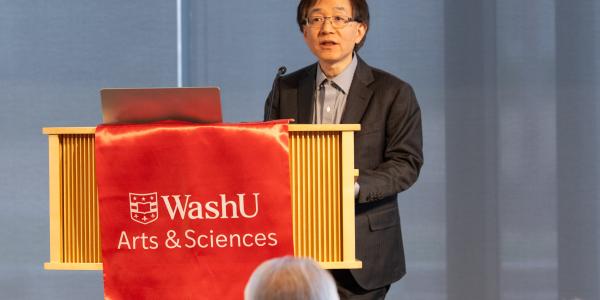In spring 2020, the Center for the Humanities will play host to Dorothy Pokua Agyepong, PhD, a linguist from the University of Ghana. Here, we ask her about her current research project, the intersection of humanities and linguistics, and what she is most looking forward to during her St. Louis sojourn.

Thanks to the BECHS-Africa Fellowship program, the Center for the Humanities will host linguistics scholar Dorothy Pokua Agyepong from the University of Ghana during the spring 2020 semester. With funding from the Andrew W. Mellon Foundation, and in partnership with the University of Ghana, American University in Cairo and Stellenbosch University, the three-year transnational program is aimed at enhancing research capacity for early career scholars in the humanities. Each year, early career scholars from the four institutions are invited to apply for a residential fellowship exchange. (See web link above for more details.) Agyepong is WashU’s first incoming fellow.
Briefly, what do you plan to accomplish during your fellowship, and what is the larger project you’re working on?
During my stay at Washington University St. Louis, I plan to work on two articles from my doctoral thesis. The tentative titles of the articles are “When ‘Break’ Means ‘Cut’: The Semantics and Combinatorics of Bú ‘to Break’ and Pàè ‘to Split’ in Asante-Twi” and “He Tore/Ripped My Heart Apart: Expressing Tearing in Asante-Twi.”
The goal is to investigate the extra-contextual uses of these verbs in Asante-Twi. For instance, why would a speaker express the English sentence “I have a headache” as Me ti pae me, literally, “my head splits me,” in Asante-Twi. What does this expression really mean to the Asante-Twi speaker? Is the split meaning in this construction the same as what we have in Kofi pae gya no (“Kofi split the firewood”)? My work attempts to answer these and many other questions about the behavior of separation verbs in different constructions. Most importantly, it seeks to reveal the role that culture plays in deriving some of these interpretations. Currently, I am in the process of writing up publications from my 2017 doctoral thesis. So, as part of the larger project, these two publications, when successfully completed and published, will add up to the two that are currently under review, for publication in reputable journals.
You are fluent or have familiarity with six languages. How does that affect your work as a linguist?
In Ghana, multilingualism is a norm rather an exception, given that almost every Ghanaian speaks more than one language. For instance, I speak two dialects of Akan (Twi and Mfantse), Ga, Standard Ghanaian English, Ghanaian Pidgin English and French. Apart from the financial and economic benefits that come along with being multilingual, my ability to interact in more than one language has taught me one crucial thing — to appreciate the fact that every language has its own rules of usage, even if they are structurally similar. I have come to know that language is more than just words, phrases, clauses and sentences. Being multilingual has opened my eyes to the fact that language embodies a people’s culture and belief.
As a linguist, I approach every linguistic analysis from this perspective. Thus, rather than approaching an analysis from a preconceived idea of what the language should be or how it should behave, I allow the language to “speak” for itself. I delve into the language, allowing myself to learn not only about the string of words that make up the language, but, more crucially, I learn how the culture of people influence their use of language.
How does the field of linguistics intersect with the humanities?
Linguistics is concerned with the scientific study of the nature and features of human language. It provides the most important components needed to better understand what it means to be human. As a humanities discipline, linguistics investigates how meaning is conveyed via human language, how children acquire language, ways in which language interacts with the society, the cultural norms and practices that govern the use of human language, and the mental processes involved in the production and comprehension of human language. It is described as a scientific study because it adopts a rigorous scientific approach to the study of human language. This involves collecting data and observing the relationships that exist between forms in order to make general statements about language use (cf. Yule 2016).
What disciplines at Washington University do you see your work overlapping with?
In my approach to semantic analysis, emphasis is placed on the meanings of words and their contextual interpretations, so I see my work overlapping with Anthropology (language, culture and society), African and African-American Studies, Education and the Linguistic Studies program.
What experiences are you looking forward to regarding your temporary new home in St. Louis and at Washington University?
The thought of St. Louis as my “temporary new home” is simply exciting. Even more exciting is the fact that I get to be integrated into another culture. I am really looking forward to building lifelong relationships and networks with the people I meet and work with at Washington University. It is my hope that Washington University will provide a safe and an inclusive environment that encourages learning, capacity building, mentoring, etc. In this regard, I look forward to getting the necessary assistance and resources needed to complete my proposed project in good time. Overall, I look forward to having an opportunity to develop myself as a young female African scholar.





